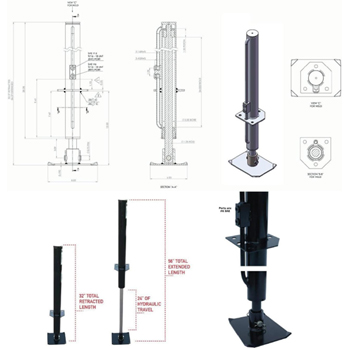Hvad er Hydrauliske Aktuatorer - En hydraulisk aktuator er en komponent af en hydro-mekanisk transmission, der bruges til at overføre, vedligeholde og kontrollere energi ved hjælp af trykfyldt væske. Den anvendes bredt i produktionssektoren, bygningsindustrien samt for transportsystemer. I denne artikel vil vi gå i dybden med hydrauliske aktuatorer og deres fordele og ulemper for at hjælpe dig med at træffe et informeret valg om, hvilken der passer bedst til dit system.
Typer af Hydrauliske Aktuatorer
Hydrauliske aktuatorer findes i to primære typer: hydrauliske cylindere og hydrauliske motorer. Hydrauliske cylindere giver lineær bevægelse, mens hydrauliske motorer giver rotationsbevægelse. Selvom begge mekanisk set er meget forskellige i deres funktion, deler de den fælles grundlæggende princip, at hydraulisk tryk bruges til at skabe bevægelse.
Funktionsprincippet for hydrauliske aktuatorer
Disse enheder består af: Et oliebeholder, en pumpe, enklever og en cylinder eller motor (2) Det er en pumpe, der skaber tryk i den hydrauliske olie for at flyde gennem enkleverne og derefter rettes ind i cylinderen eller motoren. Når væsken i et hydraulisk system trykkes op, bevæger den sig (øvelser tryk) mod en anden piston inde i en cylinder for at få denne til at begynde at bevæge sig. Denne bevægelse kan bruges til lineær bevægelse for at flytte store laster eller maskinestykker, samt rotation af en akse.
Vælg den perfekte aktuator til din anvendelse
Flere faktorer skal tages i betragtning, når man vælger den rigtige hydrauliske aktuator. Den type bevægelse, der kræves (lineær eller rotatorisk) --> anvendes. Derudover skal der overvejes, hvor stor belastningen eller kræftens størrelse skal være. Hydrauliske cylindere bruges til tyngre belastninger, mens hydrauliske motorer er mere egnet til lette applikationer. Til sidst er det nødvendigt at overveje hastigheds- og nøjagtighedsbehovene, samtidig med at hydrauliske cylindere fremhæves. Det påpeges, at i forhold til en standard elektrisk motor kalenderingsmaskine leverer en hydraulisk cylinder større hurtighed for denne type af enhed.
Fordele og ulemper ved hydrauliske aktuatorer
Hydrauliske aktuatorer har flere fordele i forhold til andre aktuatorer, der er tilgængelige. Disse har en hurtig dynamisk respons tid, der kan udbyde op mod fem gange så høj en effektdensitet som elektriske, pneumatisk eller mekaniske aktuatorer. Desuden er de kendt for at være pålidelige og varige, da disse enheder har en meget lang servicelevetid med næsten ingen vedligeholdelse.
Dog bør man også overveje ulemperne ved hydrauliske aktuatorer. De kan skabe støj og vibrationer, hvilket kan være problematisk i bestemte anvendelser. Nu tages det påstand at hydraulereservoiret spiser op dyrebart plads og vægt i systemet.
Typiske Anvendelser for Hydrauliske Aktuatorer i Industrien
Hydrauliske aktuatorer bruges bredt i en række industrier på grund af deres mange fordele. Disse hydrauliske cylindere bruges i byggeudstyr til at løfte og flytte tunge ting som kranarmer eller udgravningsbøger. Hydrauliske motorer bruges inden for transportsystemer til at drive industrielt maskineri - f.eks. bananlæg og pumper. Desuden bruges hydrauliske aktuatorer vidt omkring til hejse- og roteringsbevægelser, som en del af materialehåndteringssystemer til hejsning eller bananoperationsopgaver.
I samlet, spiller hydrauliske aktuatorer en afgørende rolle i mange industrielle og produktionsprocesser. Den unikke kombination af fremragende styrkeforhold, pålidelighed og holdbarhed gør vores systemer ideelle for et bredt spektrum af anvendelser. For at virkelig vide, hvilken der er bedst egnet til din specifikke situation, skal du fuldt ud forstå, hvordan hydrauliske aktuatorer fungerer, hvad deres fordele er og også hvad ulemperne kan være.

 EN
EN
 AR
AR
 BG
BG
 HR
HR
 CS
CS
 DA
DA
 NL
NL
 FI
FI
 FR
FR
 DE
DE
 EL
EL
 HI
HI
 IT
IT
 JA
JA
 KO
KO
 NO
NO
 PL
PL
 PT
PT
 RO
RO
 RU
RU
 ES
ES
 SV
SV
 CA
CA
 TL
TL
 IW
IW
 ID
ID
 LV
LV
 LT
LT
 SR
SR
 SK
SK
 UK
UK
 VI
VI
 HU
HU
 TH
TH
 TR
TR
 FA
FA
 MS
MS
 GA
GA
 CY
CY
 KA
KA


